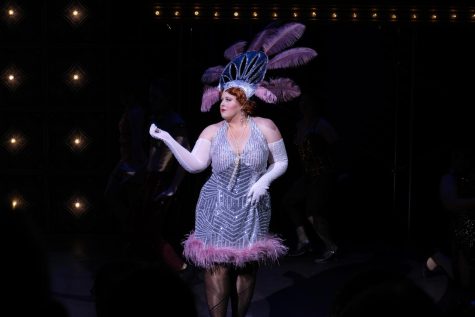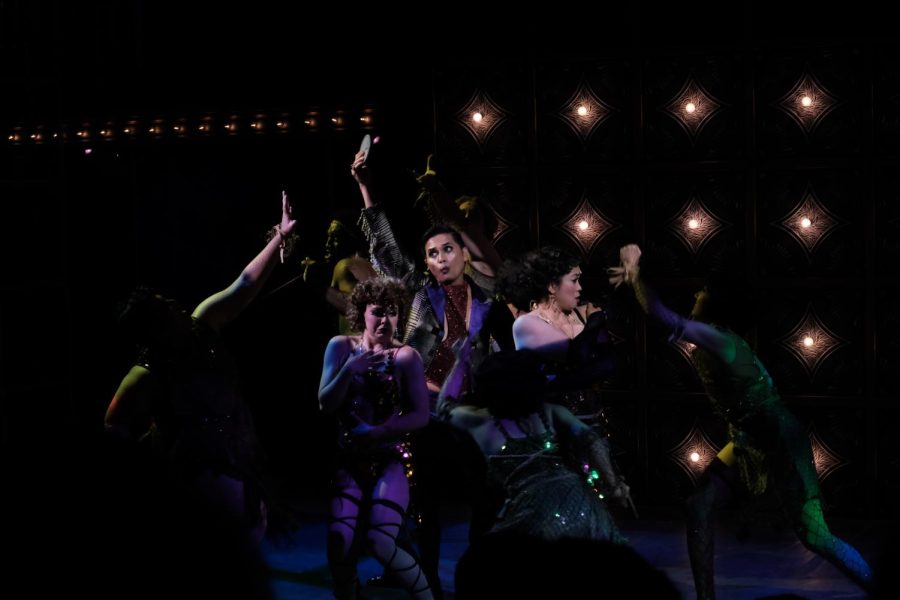On April 28, San Diego State University showcased its last musical of the semester, “Cabaret” on the Main Stage amid ongoing construction on the Don Powell and New Prebys Stages.
The production is directed by Stephen Brotebeck and takes place in post-World War I Berlin—an era of lively culture and turning tides.
The musical opens with aspiring novelist Cliff Bradshaw (played by Zakk Mannella) as he arrives in Berlin to find inspiration for his latest novel. The plot focuses on the tumultuous relationship that unfolds between him and the free-wheeling nightclub singer Sally Bowles.
Walking into the theater, attendees are immediately transported to The Kit Kat Club, a spectacular gay nightclub lined with cabaret tables and phones to call for potential partners.
The orchestra, directed by Robert Meffe, perched above the corner of the stage and set the mood for the night’s debauchery. The immersive house setup enhanced the experience for many.
“It was so much fun! I loved sitting at the tables—it’s a lot like environmental theater,” said Jeanne Taylor, a television, film and new media major.
The Emcee, portrayed by Wilfred Paloma, and company dazzled the audience with the sparkly, energetic opening number “Willkommen.” Paloma’s charismatic narration served as a powerful support for the fast-paced action of the first act.
The choreography for the musical numbers helped allow the perfect amount of movement to complement the dynamic costumes created by Claire Peterson, the costume designer. Sequins, feathers and bejeweled bodices added to the flamboyant atmosphere of the club.

Here viewers meet the leading lady, Sally Bowles, played by Lindsey Grant, a master of fine arts (MFA) candidate in musical theater at SDSU. In the song “Don’t Tell Mama,” Grant commanded the stage with her powerhouse voice and humorous physical comedy. Throughout the performance, she added vulnerability to her portrayal of Sally, supporting more emotional solos like “Maybe This Time.”
There were points in Act II when it felt like Cliff was being played as a younger, inexperienced character who couldn’t match Sally’s depth and worldliness. It seemed as though Sally was self-aware of the instability of her career, but Cliff never acknowledged this, making him look more naive than her.
As characters step outside of The Kit Kat Club and into the real world, the simplistic staging is a reminder of the ongoing turmoil in Germany. All at once, shimmering nightclub attire turns to woolen trench coats and modest dresses. The contrast in costuming emphasizes this environmental shift.
While The Kit Kat Club maintained its clubby and glamourous irreverence, the cast was comfortable addressing dark themes, like antisemitism and abortion in Act II. The political atmosphere of the time threatened many of the identities the play centers on, and it appropriately translated that uncertainty.
The romance between Herr Schultz and Frauline Schneider evolved maturely and sensitively. Natalie McClure, an MFA musical theater candidate, expertly navigated the role of a woman torn between survival and love in her performance as Frauline.
MFA musical theater student Justin Brill juxtaposed the stoic and stubborn side of Frauline with the mild-mannered Herr Schulz to create a sweet and honest chemistry. The poignant sense of hesitancy between the two steadily built the suspense of Frauline’s eventual choice. Those who enjoyed the show expressed their amazement at the level of production and detail.
“I’ve seen other plays on the Main Stage—this one seems to have more pizazz,” Jessika Luna, an English major, said.
SDSU’s “Cabaret” is a perfectly marvelous play that encapsulates the mood of an era before the world stopped.
With a captivating mix of costumes, choreography and music, the musical tells a story with heart and passion while not sacrificing authenticity for gauche comedy. The talented company of “Cabaret” makes sure their audiences feel welcome as they tell this story of love, loss and a nightclub in Berlin.










